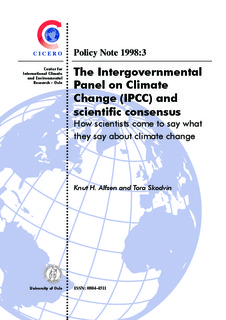The Intergovernmental Panel on Climate Change and scientific consensus: How scientists come to say what they say about climate change
Working paper

View/
Date
1998Metadata
Show full item recordCollections
- CICERO Policy Notes [65]
Abstract
In its Second Assessment Report (SAR) from 1995 the IPCC concluded that
«The balance of evidence, from changes in global mean surface air temperature and from changes in geographical, seasonal and vertical patterns of atmospheric temperature, suggests a discernible human influence on global climate. There are uncertainties in key factors, including the magnitude and patterns of long-term natural variability.»
Although carefully worded the statement has created a rather heated debate, also among climate scientist. Some well-known and respected scientists disagree that we at this moment in time are able to discern a human influence on the global climate. Also in connection with the production of the last Assessment report, some procedural errors were introduced in the final editing of the chapters of the report. These errors were then used by interest groups opposed to climate change policy to discredit the whole report and the organisation producing the report - IPCC.
On this background it is understandable that some have come to see IPCC and its reports as mainly political manifestations, to be discussed within the political arena on par with other political topics such as the ‘right’ fiscal policy, etc. Thus, a basic misconception of IPCC as a political body has been spreading.
In this presentation we will first of all try to convey what IPCC is and what it is not. Then we will come back to a discussion of the above statement on the likely human impact on climate change and briefly relate it to natural climate change in the past. In closing, we will finally say a few words on the nature of the problem of climate change.